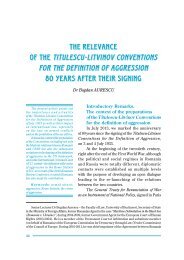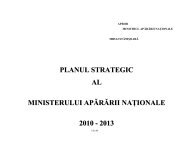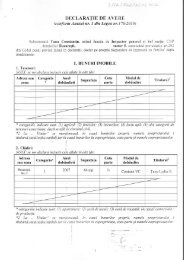Create successful ePaper yourself
Turn your PDF publications into a flip-book with our unique Google optimized e-Paper software.
����� Review of Military History �����<br />
PREFACE<br />
PREFACE<br />
Major Major General General (Ret) (Ret) Dr. Dr. MIHAIL MIHAIL E. E. IONESCU<br />
IONESCU<br />
Director Director Director Director Director of of of of of the the the the the Institute Institute Institute Institute Institute for for for for for Political Political Political Political Political Studies Studies Studies Studies Studies<br />
of of of of of Defense Defense Defense Defense Defense and and and and and Military Military Military Military Military History History History History History<br />
The Hellenic and the Romanian Commissions of Military History, together with the Institute for<br />
Political Studies of Defense and Military History, after seven years, are dedicating a new issue of the<br />
“Review of Military History” to the history of political-military relations between our countries, with a<br />
Pontic connotation this time.<br />
A people of navigators and merchants, the old Greeks „discovered” the Black Sea by the expedition<br />
of Argonauts in <strong>sea</strong>rch of the Golden Fleece (XIII th Century B.C.), annexed it to the written history,<br />
firstly through Homer and Hesiodus, than in much circumstantiate manner, together with the entire<br />
basin of the Danube, thanks to the work of Herodotus. But, by the Hellenic influence to the development<br />
of the autochthonous civilization, the historical relations between old Greeks and the Carpathian-<br />
Danubian-Pontic regions and their inhabitants, the Geto-Dacians, date back from more than three<br />
millennia.<br />
Although the Black Sea is a part of the Eastern Mediterranean basin, being considered as its<br />
prolongation, the possession of the Straits is the key for the geopolitical understanding of the history of<br />
Pontus, of the political relations between the inhabitants of its shores and Greece.<br />
The possession of the Straits is essential not only for the developement in the Aegean, but also for<br />
the Black Sea. The Greek possession of Dardanelles and Bosphorus in the ancient world explained the<br />
Greek colonization on the Pontic shores, afterward being challenged by the Persians.<br />
On the eve of the Christian era the Roman expansion in the Pontic basin, the development of the<br />
Roman Empire and the transformation of the Black Sea into a “Roman lake” were possible by the strong<br />
control over the Straits. Their exceptional geopolitical significance is proved by the translation to<br />
Constantinople of the capital of the Roman Empire and its survival, the Byzantine Empire. By the<br />
function of the Black Sea as a “Byzantine lake” and of an “Imperial Danube” until the IV th Crusade<br />
(1204), were possible the spreading of the mediaeval Greek civilization and the implementation of<br />
political forms, essential for the incipient organization of Romanian statehood.<br />
During the „Turkokrateia” and the locking of the „Ottoman lake” – even if the Black Sea navigation<br />
and trade relations between the Greeks and the Romanian Principalities have remained vigorous, the<br />
Greek sailors and merchants being the main instrument of the naval communications –, the Ottoman<br />
control over the Straits mediated or prohibited all political connections. But even in these conditions, in<br />
the XVI th -XVIII th centuries, the influences and the flourish of the Greek culture were important for the<br />
building of the modern civilization in the Romanian Principalities.<br />
The Peace of Adrianople (1829) started a new era for the Romanian - Greek relations, by opening the<br />
Blake Sea and the Danube to the great world trade and also by the emergence of a Greek state. The<br />
important commercial partnership between Romania and Greece, the presence of colonies of Greeks<br />
merchants in the Danubian and Pontic harbors influenced the development of the modern Romanian<br />
urbanism.<br />
Greece and Romania were involved in the Balkan crisis of 1912 – 1913 ended with the Peace Treaty<br />
of Bucharest of 1913. The two countries were finally on the same side during the WW I and Greek units<br />
participated at the second French mission of General Berthelot in Romania (1919), in the North-Eastern<br />
Black Sea.<br />
If, after 1923, the Greek political interest was focused on the East Mediterranean, we assist to a<br />
strong Balkan dimension of the Romanian-Greek relations, by purpose to conserve here, with the<br />
Yugoslavian alliance, the Versailles system, and, with Turkey, the status of Black Sea. Predominantly<br />
3

















